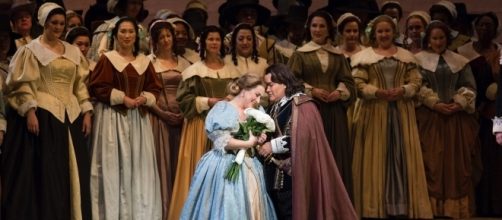Opera ticket holders were sorely lacking Saturday evening, Feb. 25, at Metropolitan Opera. Those who attended, though, gave robust ovations start to finish when German soprano dynamo Diana Damrau and Javier Camarena, an ardent tenor of exquisite elegance from Mexico, headlined Vincenzo Bellini’s masterpiece ‘I Puritani.’ Venezuelan bass-baritone Luca Pisaroni and Russian baritone Alexey Markov provided solid support for the voice’s lowest range. Italian maestro Maurizio Benini presided from the podium over a charming 41-year-old production with sets by Ming Cho Lee.
Opera what-ifs
Regretful what-might-have-been questions always arise with this work, since the 34-year-old composer tragically died just eight months after this—his 11th—opera’s 1835 premiere. His trademark expansive, ornate, lyrical vocal lines of heart-wrenching melodious legato are the stuff sighs are made of. In fact, 19th-century poet Heinrich Heine once called Vincenzo Bellini himself “a sigh in dancing pumps and silk stockings.”
Opera soprano all over the stage
Diana Damrau gives a committed performance as Elvira, the heroine of delicate emotional constitution. Her vocalism of dazzling prowess impresses, even thrills. Take, for example, Arturo’s big entrance, “Ah te, o cara.” At its climax she twice sustains a messa di voce following a forceful attack, a two-time, 13-second wonder.
(Cue YouTube video to 4:40 to sample.)
That lovely touch doesn’t upstage her costar. Her hyperkinetic schoolgirl giddiness as the lucid Elvira grows a tad tiresome, even as do the frequent recoiling and jolts of fright during madness. Her 18-minute Act II mad scene “Qui la voce … Vien diletto!” seems without event, but other moments are exquisite, especially in duet or ensemble, like the fantastic “Son vergin vezzosa.”
Opera tenor par excellence
An earnest actor, Javier Camarena seems incapable of any vocal misstep in his compelling note-spinning. His voice inhabits the upper tenor range and solidly projects the highest notes as if with effortlessness. A bell-like clarity and tonal purity successively caress and pierce the heart, as the dramatic situation demands.
For all but the final five minutes of the opera, his character, Lord Arturo Talbot, plays the political enemy of everyone onstage. But it is obvious to all that Elvira cares nothing for politics. She does care, however, about her beloved running off with another woman—a prisoner at that—the pivot on which the plot turns.
Opera onstage support
Venezuelan bass-baritone Luca Pisaroni portrayed Sir Giorgio Walton, Elvira’s sympathetic and supportive uncle, with palpable paternal poignancy, his rich, burnished voice as lovely as his acting. Russian baritone Alexey Markov intoned the role of jealous Sir Riccardo Forth with pleasing vocalism, his stylish “Ah! per sempre io ti perdei” auguring quite well for the rest of the opera.
Mezzo-soprano MaryAnn McCormick replaced an ailing Virginie Verrez as Queen Enrichetta. Ms. McCormick’s robust mezzo makes a case for rewriting the too-brief role and perhaps devising a welcome return after Arturo rescues the queen from certain doom. Implausible? Yeah, but who expects plausibility from opera?
Opera orchestra and chorus unsurpassed
The splendid Metropolitan Opera Orchestra performs lustrously under Maurizio Benini’s steady hand. Bel canto style courses through his veins. With ever-propulsive tempi that never lag, he supports the soloists as if breathing when they breathe. Depending on how you count, the Metropolitan Opera Chorus performs 17 numbers in this choral-heavy work. These range in duration from burp-like brevity to substantial scena.
With perfectly synchronized dynamics and utterly clear diction, whether providing scarcely audible staccato sotto voce reinforcement to a soloist, duet or other ensemble or when erupting in seismic-force unison … Ah, sheer refinement!
‘I Puritani,’ by Vincenzo Bellini: closes Feb. 28, Metropolitan Opera, Lincoln Center for the Performing Arts, New York, N.Y.

